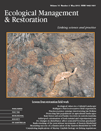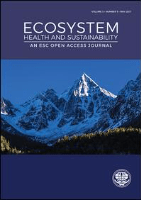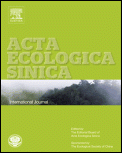
Ecological Indicators
Scope & Guideline
Advancing ecological knowledge for a sustainable future.
Introduction
Aims and Scopes
- Ecological Risk Assessment:
The journal emphasizes the development and application of ecological risk assessment frameworks that quantify the potential impacts of human activities and environmental stressors on ecosystems. - Ecosystem Services Valuation:
A core focus is on assessing and valuing ecosystem services, enabling better understanding of the benefits provided by natural systems and informing decisions on land use and conservation. - Biodiversity Monitoring and Conservation:
The journal publishes research on biodiversity indicators and methodologies for monitoring species and habitats, which is crucial for effective conservation strategies. - Remote Sensing and Spatial Analysis:
Utilizing remote sensing technologies and spatial analysis techniques to study ecological patterns and processes is a prominent theme, allowing for large-scale assessments of environmental changes. - Climate Change Impacts:
Research exploring the effects of climate change on various ecological parameters and systems is increasingly prominent, providing insights into adaptation and mitigation strategies. - Sustainable Land Use and Management:
The journal also addresses sustainable land-use practices and management strategies that integrate ecological principles to promote resilience and sustainability.
Trending and Emerging
- Machine Learning and AI Applications:
The incorporation of machine learning and artificial intelligence in ecological modeling and data analysis is trending, enhancing predictive capabilities and providing new insights into ecological dynamics. - Ecosystem Service Trade-offs and Synergies:
Research focusing on the trade-offs and synergies among different ecosystem services is emerging, highlighting the complexities of managing multiple services in a changing environment. - Integrative Approaches to Urban Ecology:
There is a growing interest in integrative approaches to urban ecology that consider the interplay between urbanization and ecological health, emphasizing the importance of green infrastructure. - Long-term Ecological Monitoring:
The emphasis on long-term ecological monitoring programs is increasing, driven by the need to understand ecological changes over time and inform adaptive management strategies. - Climate Adaptation Strategies:
Emerging research on climate adaptation strategies for ecosystems is gaining prominence, reflecting the urgency of addressing climate change impacts on biodiversity and ecosystem services. - Interdisciplinary Research:
Collaborations across disciplines, including sociology, economics, and environmental science, are becoming more common, enhancing the understanding of socio-ecological systems and their management.
Declining or Waning
- Traditional Biomonitoring Techniques:
There is a waning interest in traditional biomonitoring techniques that rely solely on species presence/absence data, as newer, more integrative approaches utilizing environmental DNA and advanced statistical models gain traction. - Focus on Single Species Studies:
Research centered on single species as indicators is decreasing in favor of multi-species and community-level assessments that provide a more holistic view of ecosystem health. - Static Ecological Models:
The use of static models for ecological assessments is declining, with a shift towards dynamic modeling approaches that account for temporal changes and interactions within ecosystems. - Local Scale Assessments:
There is a noticeable decrease in studies focused on localized assessments, as the journal increasingly prioritizes research with broader geographical implications and cross-regional comparisons. - Descriptive Studies without Quantitative Analysis:
Descriptive ecological studies that lack rigorous quantitative analysis are becoming less common, as the field moves towards more data-driven, analytical approaches.
Similar Journals

Regional Sustainability
Bridging theory and practice in regional sustainability.Regional Sustainability is a premier open access journal published by KEAI PUBLISHING LTD, devoted to the interdisciplinary exploration of sustainable practices within urban and regional contexts. Since its inception in 2020, this journal has quickly established itself as a leading platform for innovative research, currently holding a strong position in category quartiles, including Q1 rankings in Development and Geography, Planning and Development in 2023. With its broad scope encompassing essential themes in Renewable Energy and Urban Studies, Regional Sustainability provides valuable insights and advances knowledge critical for sustainable development, drawing contributions from scholars and practitioners worldwide. The journal’s impressive Scopus rankings underscore its significance with a percentile rank of 87th in both Urban Studies and Development, making it essential reading for researchers and policymakers alike. The journal is headquartered in Beijing, China, and is committed to disseminating high-quality research that addresses contemporary challenges in sustainability.

ECOLOGICAL MANAGEMENT & RESTORATION
Leading the charge in ecological management and restoration.Ecological Management & Restoration is a premier international journal published by Wiley, dedicated to advancing the fields of ecology, environmental management, conservation, and restoration practices. With an impact factor that positions it in the Q2 category across various ecological and management domains, this journal serves as a critical platform for researchers and professionals seeking to address contemporary issues related to ecosystem health, biodiversity, and sustainable management. Covering a wide range of topics from ecological restoration techniques to policy impacts on nature conservation, the journal caters to a diverse audience and contributes to the scientific community's understanding of environmental challenges. Importantly, the journal provides significant visibility, ranking in the top percentiles within key ecological research arenas such as Nature and Landscape Conservation, reinforcing its value for researchers aiming to influence both scientific thought and practical applications in ecology and management. The journal's commitment to disseminating high-quality research makes it an essential resource for students, researchers, and practitioners dedicated to fostering a sustainable future.

Ecosystem Health and Sustainability
Connecting science and sustainability for a healthier world.Ecosystem Health and Sustainability, published by the American Association for the Advancement of Science, is a premier journal in the field of ecological research and sustainability. Established as an Open Access journal since 2015, it has made significant strides in disseminating impactful research that addresses contemporary challenges in ecosystem health within a global context. With an impressive impact factor reflected in its consistent placement in the Q1 category across multiple fields—including Ecology, Evolution, Behavior and Systematics, as well as Management, Monitoring, Policy, and Law—this journal serves as a vital resource for researchers, professionals, and students alike. Based in the United Kingdom, the journal has shown notable performance in Scopus rankings, positioning itself within the top percentiles across various ecological specialties. As it continues its convergence through 2024, Ecosystem Health and Sustainability is committed to fostering the exchange of knowledge and promoting the integration of science and policy to advance sustainable practices globally.

Ecosistemas
Empowering ecological research for a thriving planet.Ecosistemas is a prominent Open Access journal published by the ASOCIACION ESPANOLA ECOLOGIA TERRESTRE, specializing in the field of ecology. Since its inception in 2001, it has dedicated itself to advancing ecological knowledge and research, fostering an inclusive platform for the dissemination of cutting-edge studies that span ecological interactions, sustainability, and biodiversity. The journal, based in Spain, has established its reputation with notable rankings such as Q3 in the field of Ecology and Q4 in Ecology, Evolution, Behavior, and Systematics, reflecting its commitment to quality research. With a Scopus Ranks position placing it in the 40th and 37th percentiles for its categories, Ecosistemas is integral to the academic community, serving researchers, professionals, and students alike. It provides a vital resource for those seeking to understand ecological dynamics and environmental challenges, facilitating open access to important findings and discussions that shape the future of our ecosystems.

Global Ecology and Conservation
Championing innovative solutions for environmental challenges.Global Ecology and Conservation, published by Elsevier, stands as a premier open-access journal dedicated to advancing the field of ecology and conservation science. Since its inception in 2014, the journal has facilitated the dissemination of high-quality research, fostering critical dialogue on ecosystem management, biodiversity preservation, and sustainability practices across the globe. With a remarkable ranking within the top quartiles (Q1) in various categories including Ecology, Evolution, Behavior and Systematics, and Nature and Landscape Conservation, it is positioned among the leading resources for researchers and professionals alike. The journal has garnered a notable impact, ranking #65 out of 721 in Ecology, and houses articles that are vital to understanding and addressing the pressing environmental challenges of our time. Available in an open-access format, researchers can freely access and share vital findings, promoting a collaborative approach to ecological research. Global Ecology and Conservation is not just a publication; it is a critical tool for innovation and advocacy in conservation, poised to inspire the next generation of environmental stewards.

Regional Environmental Change
Illuminating the Path to Sustainable Regional SolutionsRegional Environmental Change, published by SPRINGER HEIDELBERG, is a leading journal dedicated to the critical field of Environmental Science, specifically focusing on the global and planetary changes affecting our regional environments. Since its inception in 2005 and continuing through 2024, the journal has been a pivotal platform for disseminating cutting-edge research, insights, and methodologies that address pressing environmental issues. With an impressive Scopus rank, placing it in the top 30% of journals in its category, Regional Environmental Change (ISSN: 1436-3798; E-ISSN: 1436-378X) showcases high-quality academic articles that engage with the multifaceted impacts of environmental shifts, providing researchers, professionals, and students with vital knowledge and data. Although the journal does not currently offer Open Access, it remains a crucial resource for those committed to understanding and mitigating the effects of environmental change on regional ecosystems and communities.

ENVIRONMENTAL MANAGEMENT
Innovating solutions for pressing environmental challenges.ENVIRONMENTAL MANAGEMENT, published by Springer, stands at the forefront of advancing sustainability and ecological stewardship in the fields of Ecology, Global and Planetary Change, and Pollution. With an impressive tracking history from 1977 to 2024 and prestigious quartile rankings reflecting its significant impact (Q1 in Ecology and Q2 in both Global and Planetary Change and Pollution), this journal engages a wide range of stakeholders, including researchers, policymakers, and environmental professionals. The journal is a vital resource for those dedicated to addressing pressing global environmental challenges, publishing rigorous interdisciplinary research that informs policy and practice. While it does not offer open access, its content remains accessible through institutional subscriptions. Located in the heart of New York, ENVIRONMENTAL MANAGEMENT is dedicated to fostering a substantive dialogue on innovative approaches to environmental preservation and management.

Nature Conservation Research
Leading the charge in ecological and environmental research.Nature Conservation Research is a prominent open-access journal that has been dedicated to advancing the field of conservation science since its inception in 2016. Published by the SARANSK FOND PODDERZKI & RAZVITIA ZAPOVEDNYH in the Russian Federation, this journal serves as a vital platform for researchers, professionals, and students alike, providing critical insights into ecological and environmental issues. With an impressive impact factor and ranked in the second quartile across multiple categories—including Agricultural and Biological Sciences, Earth and Planetary Sciences, Ecology, and Nature and Landscape Conservation—Nature Conservation Research stands at the forefront of impactful scientific discourse. The journal not only aims to disseminate high-quality research findings but also seeks to foster collaboration and innovation in conservation practices globally. By ensuring open access to its content, it promotes widespread dissemination of knowledge, crucial in the fight against biodiversity loss and environmental degradation. Researchers and practitioners contributing to the journal will find themselves at the convergence of science and conservation efforts, paving the way for sustainable ecosystem management.

Acta Ecologica Sinica
Advancing ecological understanding for a sustainable future.Acta Ecologica Sinica, published by Elsevier, is a prominent journal in the field of ecology, with a strong focus on fostering understanding in ecological principles and their applications. Established in China, this journal holds an impressive Q2 categorization in both Ecology and Ecology, Evolution, Behavior and Systematics as of 2023, positioning it within the top tier of ecological research. With its Scopus rankings placing it in the 81st and 78th percentiles in relevant ecological domains, it serves as a vital platform for researchers and practitioners to disseminate findings that promote ecological sustainability. Although it operates under a traditional access model, its significant impact is underscored by its systematic convergence of key ecological inquiries across multiple years (2006-2008, 2014, 2017-2023). By engaging with the latest empirical studies, theoretical advancements, and methodological innovations, Acta Ecologica Sinica is indispensable for scholars dedicated to advancing ecological knowledge and addressing environmental challenges.

Bulletin of Geography-Physical Geography Series
Connecting scholars and insights in physical geography.The Bulletin of Geography-Physical Geography Series is a prominent open-access journal dedicated to advancing the field of physical geography. Published by Nicolaus Copernicus University in Poland, this journal has been a vital resource for researchers, professionals, and students alike since its inception in 2009. With an ISSN of 2080-7686 and an E-ISSN of 2300-8490, it contributes significantly to the academic discourse in geography, planning and development, and geophysics, boasting a 2023 Scopus rank of #385 in Social Sciences and #84 in Earth and Planetary Sciences. The journal aims to disseminate innovative research and critical insights that address contemporary challenges in physical geography, making it a valuable platform for those seeking to contribute to or stay informed about the latest developments in the field. With its commitment to quality and accessibility, the Bulletin of Geography-Physical Geography Series plays a crucial role in fostering scholarly exchange and collaboration globally.